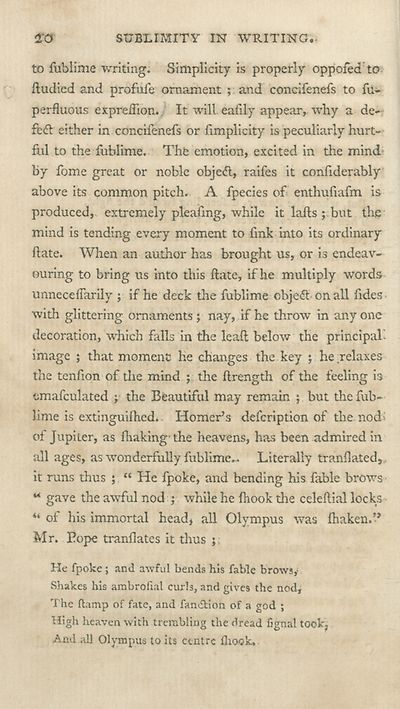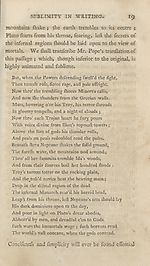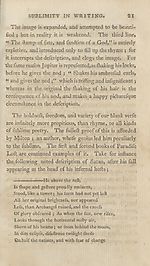Download files
Complete book:
Individual page:
Thumbnail gallery: Grid view | List view

SUBLIMITY IN WRITING.
*0
to fublime WTiting. Simplicity is properly oppofed to
ftudied and profufe ornament ; and concifenefs to fu-
perfluous expreffion., It will eafily appear, why a de¬
left either in concifenefs or fimplicity is peculiarly hurt-
fi.il to the fublime. The emotion, excited in the mind
by fome great or noble objeft, raifes it confiderably
above its common pitch. A fpecies of enthufiafm is
produced, extremely pleafmg, while it lafts ; but the
mind is tending every moment to fink into its ordinary
ftate. When an author has brought us, or is endeav¬
ouring to bring us into this ftate, if he multiply words
unneceffarily ; if he deck the fublime objeft on all fides
with glittering ornaments; nay, if he throw in anyone
decoration, which falls in the leaft below the principal
image ; that moment he changes the key ; he relaxes
the tenfion of the mind ; the ftrength of the feeling is
cmafculated y the Beautiful may remain ; but the fub¬
lime is extinguiftied. Homer’s defcription of the nod
of Jupiter, as fhaking’ the heavens, has been admired in
all ages, as wonderfully fublime.. Literally tranflated, .
it runs thus ; “ He fpoke, and bending his fable brows
“ gave the awful nod;; while he {hook the celeftial locks
“ of his immortal head* all Olympus was fhaken.”
Mr. Pope tranflates it thus ;
He fpoke ; and awful bends his fable brows,-
Shakes his ambrofial curls, and gives the nod,
The (lamp of fate, and fanftion of a god ;
High heaven with trembling the dread fignal took.
And all Olympus to its centre fliook.
*0
to fublime WTiting. Simplicity is properly oppofed to
ftudied and profufe ornament ; and concifenefs to fu-
perfluous expreffion., It will eafily appear, why a de¬
left either in concifenefs or fimplicity is peculiarly hurt-
fi.il to the fublime. The emotion, excited in the mind
by fome great or noble objeft, raifes it confiderably
above its common pitch. A fpecies of enthufiafm is
produced, extremely pleafmg, while it lafts ; but the
mind is tending every moment to fink into its ordinary
ftate. When an author has brought us, or is endeav¬
ouring to bring us into this ftate, if he multiply words
unneceffarily ; if he deck the fublime objeft on all fides
with glittering ornaments; nay, if he throw in anyone
decoration, which falls in the leaft below the principal
image ; that moment he changes the key ; he relaxes
the tenfion of the mind ; the ftrength of the feeling is
cmafculated y the Beautiful may remain ; but the fub¬
lime is extinguiftied. Homer’s defcription of the nod
of Jupiter, as fhaking’ the heavens, has been admired in
all ages, as wonderfully fublime.. Literally tranflated, .
it runs thus ; “ He fpoke, and bending his fable brows
“ gave the awful nod;; while he {hook the celeftial locks
“ of his immortal head* all Olympus was fhaken.”
Mr. Pope tranflates it thus ;
He fpoke ; and awful bends his fable brows,-
Shakes his ambrofial curls, and gives the nod,
The (lamp of fate, and fanftion of a god ;
High heaven with trembling the dread fignal took.
And all Olympus to its centre fliook.
Set display mode to:
![]() Universal Viewer |
Universal Viewer | ![]() Mirador |
Large image | Transcription
Mirador |
Large image | Transcription
| Antiquarian books of Scotland > Languages & literature > Abridgement of lectures on rhetoric > (36) |
|---|
| Permanent URL | https://digital.nls.uk/135466886 |
|---|
| Description | Thousands of printed books from the Antiquarian Books of Scotland collection which dates from 1641 to the 1980s. The collection consists of 14,800 books which were published in Scotland or have a Scottish connection, e.g. through the author, printer or owner. Subjects covered include sport, education, diseases, adventure, occupations, Jacobites, politics and religion. Among the 29 languages represented are English, Gaelic, Italian, French, Russian and Swedish. |
|---|

